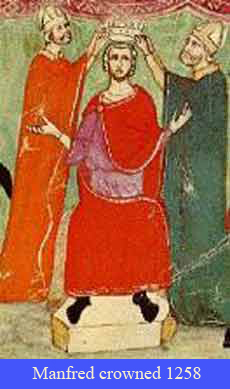Conrad IV had left behind a
son, Conradin, but he was only a child and located in Germany away from
the center of power in the south. Manfred, who as illegitimate son of
Frederick II could never aspire to the title of Holy Roman Emperor, held
the regency of the Kingdom of
Sicily. Despite illegitimate birth, he had de facto control of the
Kingdom of Sicily and was anxious to have his power confirmed. For
Innocent, it appeared to be a golden opportunity to bring the old Norman
kingdom back under papal control. With a certain amount of cynicism, both
Manfred and Innocent agreed that Conradin's feudal rights to the kingdom
should be considered when he came of age, but Innocent then proceeded to
grant Manfred the title of Prince of Taranto and confirm his power as
regent in return for papal control of the kingdom. However, it is clear
that the two parties had different concepts of what papal authority
implied. Innocent appears to assumed that it gave him license to dismantle
the old Norman governmental structure throughout the kingdom and to
replace it with free communes and a papal bureaucracy. For Manfred, this
situation was of course intolerable as it struck directly at his base of
power. By November 1254 Manfred had rallied his forces and defeated the
papal forces in southern Italy. The sudden turn of events had proved a
shock to Innocent, and in December 1254 he fell ill while traveling in the
Regno and died shortly afterwards.
agreed that Conradin's feudal rights to the kingdom
should be considered when he came of age, but Innocent then proceeded to
grant Manfred the title of Prince of Taranto and confirm his power as
regent in return for papal control of the kingdom. However, it is clear
that the two parties had different concepts of what papal authority
implied. Innocent appears to assumed that it gave him license to dismantle
the old Norman governmental structure throughout the kingdom and to
replace it with free communes and a papal bureaucracy. For Manfred, this
situation was of course intolerable as it struck directly at his base of
power. By November 1254 Manfred had rallied his forces and defeated the
papal forces in southern Italy. The sudden turn of events had proved a
shock to Innocent, and in December 1254 he fell ill while traveling in the
Regno and died shortly afterwards.
Innocent IV was replaced by Alexander IV who proved totally unequal to the task of coping with such an energetic and capable ruler as Manfred. Though technically the regent for the son of Conrad IV, Conradin, Manfred moved quickly to consolidate his power. Between the time of Alexander's election as pope and his death in 1261, Manfred not only was elected king of Sicily by the parliament of barons in 1258, but he had also reestablished the policies and administration of his father while at the same time relegating the papacy to virtual impotency. By the time Urban IV was elected pope in 1261 it was clear to the curia that if the issue of the Regno was to be resolved, the Holy See would have to find a royal supporter from outside the peninsula to champion their cause.
This was not a new idea. As early as 1252 Innocent IV had offered the kingdom to Henry III of England, followed by Charles of Anjou, in return for an astronomical amount of money. The English had objected to the price and Charles had been dissuaded by his brother Louis IX who believed that Conrad was the rightful ruler. However, Innocent and his successor Alexander were persistent, and by 1257 they had received a promise of 135,541 marks from Henry of England in return for the investiture of Henry's son Edmund as King of Sicily. However, Henry's barons had no intention of paying such an extraordinary amount of money in return for a kingdom from which they could expect little or no profit. In 1258, the barons of England had seen enough of the taxes imposed to pay for the new acquisition and forced Henry to renounce the agreement, despite having already paid 60,000 marks.


